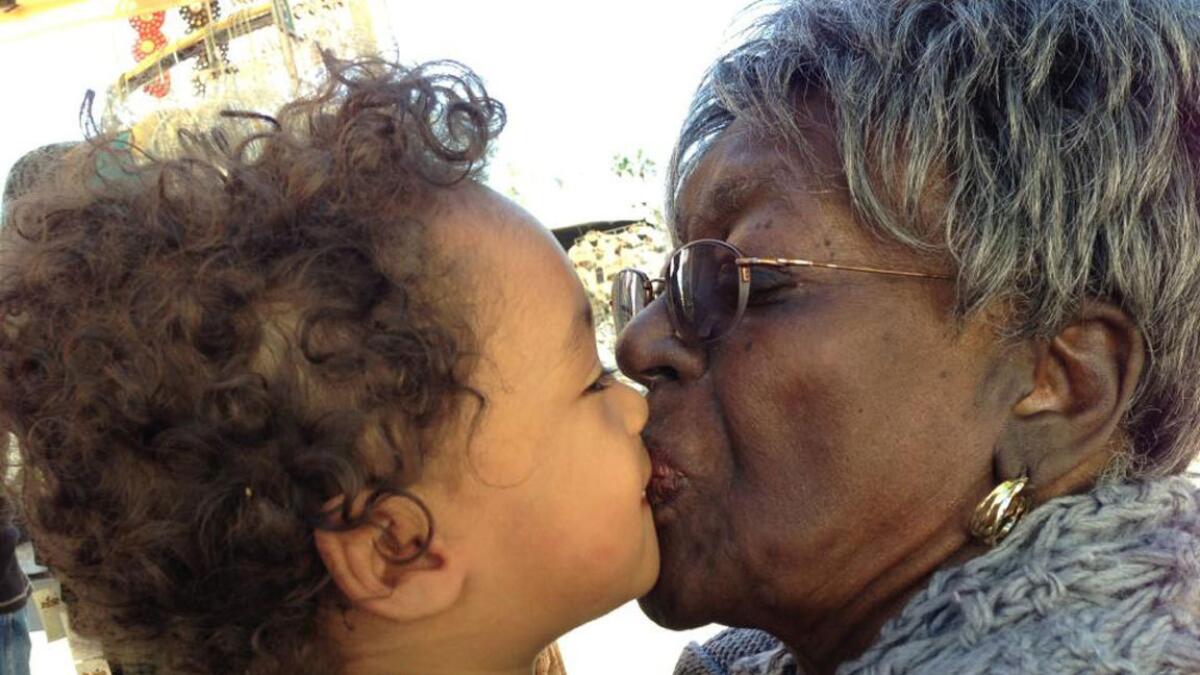Opinion: What do you say when your child asks about death?

An impromptu kiss for Nana a few days before she died following surgery in November 2012.
“Mama, why do people die?”
I have spent the last year and a half bracing for the question, even though it wasn’t exactly what I expected to hear from my 3-year-old son as I tucked him into bed the other night.
When he has asked “Where is Nana?” I’ve told him what I believe is true. I relied on that answer again on this night, even though it was a slight deflection.
“They live in our hearts when they can’t stay on Earth with us anymore,” I said.
His Nana, my mother, died the day before Thanksgiving in 2012 somewhat surprisingly following a scheduled heart surgery.
As I have been processing my own feelings as a mourning daughter, I’ve focused more on how to manage the response to death than how to tackle questions about the reason for death.
My husband and I have worked hard to keep my mom’s spirit alive for her grandson, who was 18 months old when she died.
Despite my own marrow-jolting exploration of the endless wells of grief, with him, we focused on the joy he associated with his grandmother.
When he begged to continue our daily routine of calling Nana in the morning on the ride to and from daycare shortly after she died, I played my favorite voice-mails for him. We both were comforted by the familiar lilt of her voice. Modern technology is an amazing thing; it can help you breathe a special kind of life into vapors of memory.
But on the night he asked about death, I managed to buy myself a little more time to figure out the answer, since sleep overtook his curiosity. The question would surely resurface from my “why”-focused toddler.
I asked a few of the parenting groups I participate in on social media for their input. Some said they talk about animal life cycles. Others have taken a more spiritual or religious route, offering the comfort of the afterlife. But many said they told their toddlers bluntly that people don’t live forever.
“They are born and then one day, hopefully when they’re really old, they die,” one mom wrote of how she explained death to her toddler son.
Another mother wrote, “My daughter is only 2, so I just tell her that she will see them in her dreams.” This is one of the approaches we have taken in our home too, even as we haven’t directly addressed the concept of death.
“Children understand a lot more than people give them credit for,” wrote one father, suggesting I focus more on the scientific mechanics of death.
Unlike with my son, curiosity had nothing to do with my own introduction to the subject as a child. It came while I was a captive audience in the car.
“You know, I’m going to die someday,” my mom said with her signature warm directness. “Who would you like to live with?”
She, an older divorced mother, was more of the no-nonsense Jamaican than the “no problem” type. It seemed, any time we were on car trips for an hour or more, our conversations touched on her inevitable death. I would press my hands and face to the window, counting the minutes to my escape from the conversation. (She used the same strategy to talk to me about sex.)
The unintended effect of my mom’s raw and direct effort to prepare me was that I lived in constant fear she would drop dead and leave me orphaned and alone. Every ailment led my thoughts toward the morgue.
I was hoping to spare my son some of that trauma and fear.
But, now as an older mother myself pondering how to discuss death with my son and, much later, his baby sister, I recall the result of what my mom did as something profoundly different from the short-term immediate effect of the conversation.
Because we talked very frankly about death, I understood mortality, that one day I would not have her here to call at all hours of the night. I learned the importance of valuing each moment of our relationship, no matter how trivial or annoying at the time, something I came to understand in adulthood. I came to know the reason not to say horrible things in anger.
I also knew she wasn’t afraid to die, which helped me to be less and less fearful of her death.
When the question comes again, I’ll be ready to say what I most feared as a child: My dear son, all things that live will eventually die, but love can live on forever in our hearts.
Going through the growing pains of parenthood? Join me on the journey: @mmaltaisla
More to Read
A cure for the common opinion
Get thought-provoking perspectives with our weekly newsletter.
You may occasionally receive promotional content from the Los Angeles Times.







